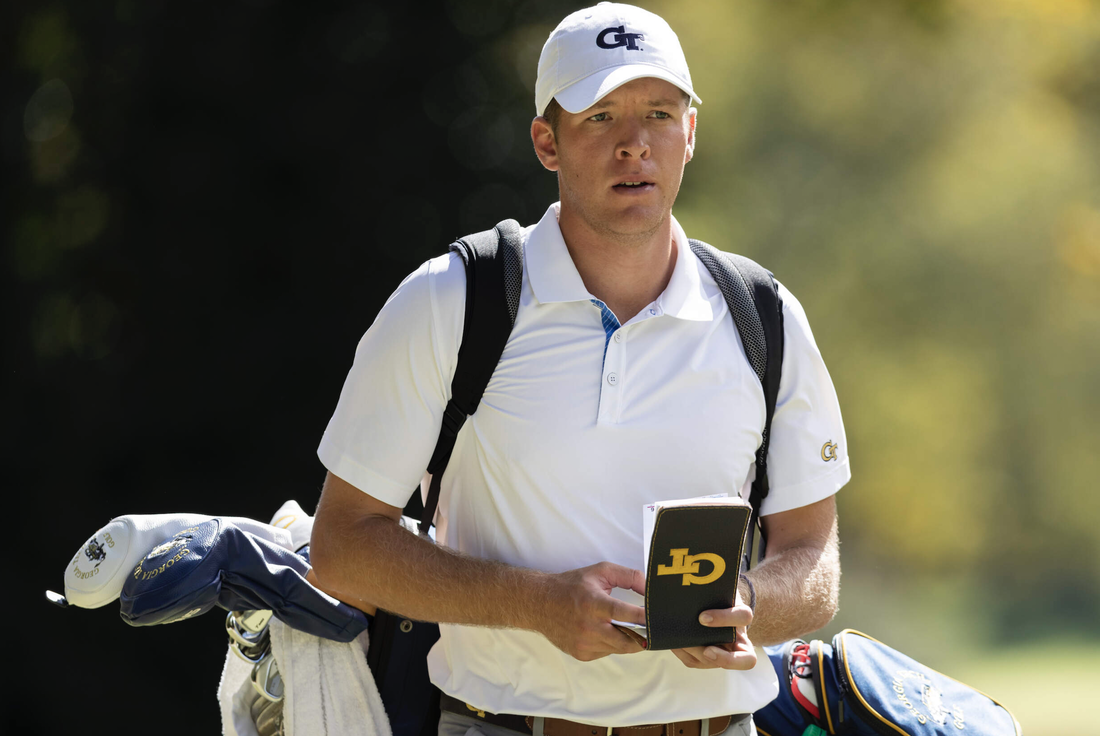|
Alex Elias After Rory McIlroy's win at the CJ Cup, McIlroy said, "I think for the last few months I was maybe trying to be someone else to try and get better, and I sort of realized that being me is enough, and I can do things like this." When, Georgia Tech golfer, Will Dickson was asked about McIlroy's comments, he responded, "There's times when you can look at others and strive to be like them, but you have to be very careful because like Rory said, your version of who you are is the best version that you're going to be." Dickson continued, "You just want to continue trying to better your version. You can get stuck trying to improve by trying to be someone else."
As the second ranked recruit in the state of Rhode Island and having won the Rhode Island State junior at 13 (youngest player to ever win the tournament), Dickson noted how the pressures began before he even arrived at Georgia Tech. Dickson said, "The pressures and expectations started to build in high school. I sort of stopped practicing the way I always did. My Dad and I used to go out onto the course by ourselves every single day growing up and I wish we had continued doing that all the way up until I went to college." Dickson continued, "That was a really special time I had with my Dad, but the last couple years of high school, I was kind of on my own. Looking back on it, I didn't really practice and prepare the way I always did growing up. That's one of the biggest regrets I have that I wish I could go back and do over again." Reflecting on his first few years at Georgia Tech, Dickson said, "I certainly built up these expectations and pressures before I even got to school and then when I got to Georgia Tech, I knew that I had to play really really well. I quickly felt way too much pressure and continued to go down this struggling path for the first few years." Much to Dickson's credit, his ability to overcome these difficulties speak volumes about his character. In a year when many people saw COVID-19 as nothing but a detriment, Dickson's one word to describe COVID was "opportunity". Dickson elaborated, saying, "It was probably the best thing that ever happened to me. I really do believe COVID was such a huge opportunity for me to get away from everything in Atlanta and at school, clean my slate and start fresh." Dickson was able to re-find a joy and love in the game, rather than solely golfing to try and win a collegiate match or tournament. Connecting back to McIlroy's comment, Dickson said, "That time almost freed me up to be a kid again. If you want to succeed at the highest level, then you need to be freed up on the golf course. I think at the end of the day, that is what Rory is talking about, just about being a kid and yourself on the golf course." Having experienced a number of ups and downs, Dickson passionately said, "I feel like I can look back on this time as something I can use to help others. So many golfers go on a straight line from junior golf to high school golf to college golf, but the thing is everyone struggles or falls eventually. If a young kid is going through a tough time, then I can help him as I know what it feels like to be at the lowest of low. It was a long road, but I got through it and I am so appreciative of the fact that I can hopefully help someone in the future."
0 Comments
Alex Elias Ryan Hager is the Director of Instruction at Plainfield Country Club, the 75th ranked course in the U.S., according to Golf Digest. Hager was named the 2021 New Jersey PGA Teacher of the Year and was placed on Golf Digest's Best Young Teachers in America.  How much does your previous shot affect the next one? Hager: I think for the average golfer it probably applies a little bit more. When you look at really great players, let’s say scratch to Tour Pros, the different parts of the game definitely affect one another, but might apply a little less. If you look at case studies, Rory McIlroy is a good example of a guy who is a pretty streaky putter regardless of how he’s hitting it. I would say on average, McIlroy hits the ball at a really elite level and is one of the best Tee-To-Green golfers on Tour, but he still has good putting weeks and bad putting weeks, even when he’s hitting it at that level. The long answer is it really depends on the player, but for the average golfer, hitting it a lit bit further and keeping it in play generally has a higher correlation to lowering one’s score because it’s easier to hit a shorter club onto the green, then miss the green with a longer club and then have to get up and down. As a Golf Professional, how important do you believe it is for a golfer to understand their own swing? Hager: Understanding your own swing is vital. When I started learning to teach at a higher level, I went and worked for a guy named Jim McLean at The Jim McLean Golf School in Miami. A process that we all learned in our training was the process of helping a person understand how to improve. The first step is you have to know exactly what you're doing. You don't need to know every single inch of your swing, but you do need to know what you do correctly, and also what you do incorrectly. You also then need to know what to do instead. That's why typically I will look at PGA Tour players in the video analysis part of a lesson and I will show somebody this is what your club face looks like during this part of the swing and here are four examples from the PGA Tour of different positions you could be in. Understanding that, you start to see the gap and notice the differences between you and world class players. Then, you need to figure out how to bridge the gap and that's where the lesson really comes into play. If you have a good instructor, they should give you the proper drills and training aids to try and bridge the gap. So, you have to know what you do, right and wrong, you need to know what you need to do instead, and how to bridge the gap between where you are and where you need to be. You really need the total picture in order to get better at golf. Do you believe amateurs should have a better pre-round routine? Do amateurs spend too much time on the range and not enough time practicing their short game? Hager: I think that practicing your short game and the way that you warm up for a round of golf are two totally different things. The short answer would be no, most people don't practice their short game enough. That said, I don't think a pre-round warm up for the average person needs to include too much of doing anything. I think generally people will almost be late to the first tee because they're spending too much time trying to fix things prior to their round. The best use of a pre-round warm up is to figure out what the ball is doing on that day. Your goal should be to get loose, work out any aches and pains and figure out what the stock swing for you is doing on that day and trust that. Then, spend some time chipping and putting. I do think 50/50 would be good, but to the same point the best use of your time is figuring out your comfort level with some different shots. I would hit a handful of short chip shots with an 8 Iron to get a feel for a safety shot that you can bump and run onto the green, hit a few chips from the rough and a couple shots from the bunker. The same goes for putting. I would do two really quick drills to work on speed. The first one being putting to an old cup on the green, so you can see the ball stop rather than going into the cup, as you can get a feel for the speed and then work on some short makable 3-6 foot putts. Lastly, I would quickly hit some long putts. I think that is all doable in thirty minutes or less. Following up on the previous question and answer, how should one's practice be divided? Hager: As far as practice goes, there's the long game which basically makes up your driving, long irons, mid irons and wedges, the full swings you'll hit over the course of the round, and then there's the short game: putting, chipping, pitching, shots from the rough, and bunker shots. I think that should be practiced 50/50. I think the best use of your time when practicing would be with a Driver, 8 Iron and then shift to short game. If you can drive the ball in play and consistently get the same draw or fade, then after that you need to be able to hit all of your irons the same way. I picked an 8 Iron, you could pick a 7 Iron, but you want to get comfortable making good contact and compressing the ball. You could essentially do that with one club and you'll have a good feel for the entire bag. Then, the other half can be spent with check-ins on the different chips and pitches based on the course you always play and then some touch control for distance. I think distance control is the hardest part of short game. Most of your time with short game should be focused on making sure the ball is going the distance you want. Alex Elias Sara Dickson is the Head Golf Professional at Wilderness Country Club (Naples, Florida). Previously, Dickson served as the First Assistant Golf Professional at Round Hill Club (Greenwich, CT) and spent multiple seasons at The Country Club (Brookline, MA). A few of Dickson's accolades are she was the 2015 Metropolitan PGA Women’s Player of the Year and the 2017 Metropolitan PGA Assistant Professional of the Year. Additionally, she was included in 2017-2018, 2019-2020 and 2020-2021 Golf Digest Best Young Teachers in America as well as the 2017-2018 and 2019-2020 Golf Digest Best Teacher By State Lists. Earlier this year, Dickson wrote an article on Golf Digest, titled, "Short-game strategy: Chipping it close starts with having a plan". Link: https://www.golfdigest.com/story/short-game-strategy-chipping-it-close-starts-with-having-a-plan  In working with you, I have noticed how you tend to focus on my thought process for each given shot. For context, on a short chip, you may ask whether I'm going to chip it high or low, and/or where I am going to land it and why. Based on our lessons and these types of questions during our lessons, the question is, How important is it to spend time beforehand to think over your options and visualize your next shot? Dickson: It is very important to think through and visualize the shot before executing. In other sports, this happens much faster than in golf. We may not realize it since it takes a fraction of a second, but when playing basketball as we are reacting to a pass, shot or play we are visualizing our next move. If we didn’t think through our next move or swing, our body would not have directions on what to do next! The best golfers have a pre-shot routine that almost never varies, even by the exact second it takes them to go through their routine. During this routine, some golfers will visualize their shot in great detail, while others prefer a broader picture. This exercise of visualizing gives our mind a picture and then allows our mind to send our body directions on how to best swing to make the shot happen. Following up on the previous question, do you believe more golfers should spend time visualizing your next shot? Is it a process that too many golfers neglect, as they are eager to pull the trigger on their next swing? Dickson: At times we can overthink and at times we can inadvertently assume there is only one way to play a shot. Golfers can easily do either, and it’s likely subconsciously. What I do know is that we are typically better at what we practice. So, if we wish to have a large toolbox of shots with which to work, we need to practice a lot of different shots. The more shots we try during practice, the more we will see on the golf course. At The Wilderness for example, I tend to hit 3 Wood on Hole No. 9 and 3 Wood on Hole. No 15 off the tee. An argument could certainly be made to hit driver but I view 3 Wood as a smarter decision. On any given course, how important is to know that driver may not be needed off every tee? Dickson: Golf is a game of connecting the dots in the best way that makes sense for your strengths in regards to the hole you have in front of you. I learned using Scott Fawcett’s “Decade Golf System”, that it is important to have an understanding of your standard deviation for each club. For example, let’s say our driver has a standard deviation of 45 yards (i.e. we have measured that our mishits can send the ball 25 yards left of our target and 20 yards to the right of our target on any given swing). If we are playing a hole where there are penalty areas or dangers within that standard deviation of 45 yards wide, then driver may not be the best play there. To use your examples on hole numbers 7 and 15… the clubs you have chosen to hit keep you from having the possibility of going in the water since your 3-wood cannot reach the trouble. This is a great strategy to save un-needed penalty strokes. Hole 15 is a classic risk/reward hole. I love it. There may be days when you hit driver into the neck of the fairway, and days where maybe you hit 3-wood to ensure you are in play. To circle back to the example of having a 45 yard standard deviation with a driver, there will be circumstances when you cannot necessarily “play it safe” due to a narrow fairway or other occurrence. In those instances, it is important to step up, and make our good, confident swing to give ourselves the best chance of hitting the fairway. My favorite part of Sara's teaching style is that when she is teaching, she not only explains the advice, but the builds on the advice by explaining the importance of the advice. To simply put it, rather than: "Try to work on X", it's "Try to work on X because if you do then you'll see this change in your swing and this result on the course". As a result, my question is: How beneficial is it for golfers to understand their own swing? Dickson: Thank you very much for that feedback as that is certainly the goal. I like to teach people in a way that prepares them for the more “pressure-packed” golf situations. When we are in the thick of a tournament, we need to have a solid understanding as to why something is a good thing to do. We cannot have any doubt regarding our swing or stroke, as our energy needs to be spent on managing the course and our mental game. Without the “why”, we will be guessing and uncommitted. When people understand why something is a good thing to do, they are more confident in the concept and are better at performing it. Alex Elias Cam Small serves as an Assistant Golf Professional at Aronimink Golf Club. Aronimink is currently the 94th ranked course in the United States, according to Golf Digest and is set to host the 108th PGA Championship (May 2026). For anyone that watches the PGA Tour week in and week out, there are countless examples of a player who record a victory following a missed cut, or vise versa, failed to make the cut after a win. While it's not always easy to compare professional golfers to amateurs, in this case, every amateur knows exactly what it is like to have their scores fluctuate. When Small was asked about the consistency in golf, he responded, "This is an outdoor sport, where conditions matter. Weather conditions matter, the conditions of the golf course matter, what sort of maintenance has been done to the golf course that day matters, and how you prepared for that day matters. For all these things to change constantly and for people to have these expectations that they're going to shoot 79 everyday, it kind of cracks me up."
While scores certainly differ from round to round, it is also prevalent that two rounds of +5 tell a completely different story. It is common to hear, "That was the most difficult 77 of my life," and on the contrary, "That was the easiest 77 of my life. Everything was clicking." When Small was asked about this notion, he responded, "I'll never forget a conversation that I had with one of my roommates in college. I said, 'How come I can always make the twelve footer that I have to make for par, but I can never make the twelve footer that I want to make for birdie." Connecting his memory to the mental side of the game, Small alluded to these thoughts being the reason golfers begin to look at scores that lie ahead in the round. Small said, "I'm guilty of it. Sometimes I'll be in tournaments and I'll make a double and then a bogey and now I'm thinking I need to play the next four even or one under." As for his advice, he said, "Enjoy the game. Enjoy struggling to make that fifteen footer. That's why you play golf. You play the game of golf because you love the challenge of getting better. No matter where you are playing or how many times a week you're playing, the people that improve are the one's that love and trust the process." As Small said, golf is a process and part of this process is understanding that results on the range don't always immediately correlate to improvements on the course. Often times, it may take days or weeks to see one's scores improved on the course. Small said, "It's incredibly difficult. It takes time and it's a big commitment to put in the time, but the ones that do see the results." Small continued, "There's a very interesting dynamic between each golfer's goals. To understand what a player is trying to get is crucial. If the goal is to never hit a fade, then I give them the tools to stop hitting a fade, but if the goal is to go from a ten to a three, then he/she is going to want it bad." Alex Elias James Nicholas, who first spoke with AE Golf News in March, joined AE Golf News, again, to discuss his first season on The Korn Ferry Tour. When asked what advice he was given, prior to his first season, Nicholas responded, "The first person I asked was Morgan Hoffman. He told me, 'Don't try to change your game to play like other people. What you do well is what got you there so just try and get better at what you do well. If you're a great driver of the ball and everyone's hitting iron off the tee, but if you feel more comfortable hitting driver, then hit driver. Don't change your game because other people are.'".
In Nicholas's first season, the former Yale golfer recorded three Top-15 finishes: T13 at The Lincoln Land Championship presented by LRS, T15 at The TPC Colorado Championship at Heron Lakes and T11 at The Price Cutter Charity Championship presented by Dr. Pepper. Including his three Top-15 finishes, Nicholas made 16 cuts, but also missed the cut 14 times, learning a valuable lesson about the level of competition on The Korn Ferry Tour. When comparing The Korn Ferry Tour to collegiate golf, Nicholas said, "The biggest difference is that everybody's better. The worst player is better. The best player is better. The average score is lower. Obviously, I went to Yale and we didn't play against the best teams in the country, so it might be different for others, but on the Korn Ferry Tour all these guys went to the best schools and are the best players from each class year. It's definitely a bit of a change, going from college where you can play your B-Game and win to if you're playing your B-Game, then you're missing the cut on the Korn Ferry Tour." For Nicholas, his motto was "Control the controllables". Nicholas elaborated on the motto, saying, "It was my first time ever playing four round tournaments and it's such a long stretch of golf, where so much can happen, so if you're thinking about it like that then it's overwhelming but if you take it one shot, one moment at a time a time it becomes much easier." While Nicholas will look to continue and build upon his mentality next season, he also acknowledge certain areas in need of improvement. Nicholas said, "Less bogeys. That's obviously a very simple way to say play better, but most of my bogeys come from hitting poor shots off the tee or into greens, so limiting the mistakes in those two aspects would be big for me." |
Archives
April 2024
|
Proudly powered by Weebly





